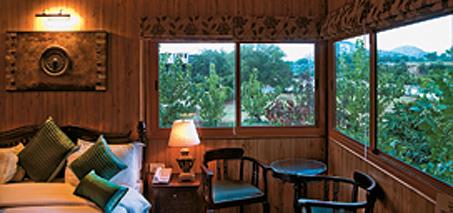I have this idea, some people think it’s silly, that if you have a problem, and you spend time in the forest — even with one tree — within half an hour, your problem will be solved. I guarantee…” Sitting out in the patio of my ‘Imperial Eagle’ cottage, the keekar-wood floorboards abuzz with the explorations of many squirrels, and a mountain of thoughts seemingly inconsequential in the light of a fascinating conversation between the two portly sparrows in front of me, I think there might be something to what Sunil Mehta had said.
The passion for trees and wildlife, which is at the heart of Mehta’s conceptualisation of the Treehouse Resort, is infectious. You can see and feel it in the frenetic way that trees, plants, creepers have taken over the property, wound their way around this cluster of machans atop keekar trees, deep in Rajasthan’s Syari valley. An area once agriculturally barren and covered with shrub vegetation, Mehta adopted it to prove that, with a little care and ecological knowhow, landscapes can be transformed, water tables rejuvenated, ancient migratory paths restored. Thus was born Nature Farms, an eco-realty project, within which Treehouse Resorts is located. Treehouse took on the commercial form that it has quite by accident — when a visitor discovered Mehta’s ‘personal machan’. (He echoes Corbett’s desire to settle in the trees, as opposed to a house on the ground, and Treehouse borrows considerably from the famous Treetop Hotel in Kenya’s Aberdare National Park, where Corbett lived after he left India.) Mehta started letting insistent travellers stay the night (“for nature lovers, it’s free”), but when the e-mails and phone calls and drop-in visitors became overwhelming, he decided to build another treehouse, and another and another. Twenty treehouses later, if you want a weekend nestled in a feathery keekar tree, you still have to book a few weeks in advance.
Treehouse Resort offers a quite unique, and perhaps unexpected, experience to the weekend traveller — come winter, summer or monsoon. The three-hour drive from Delhi that gets you to the resort is quite lovely, showcasing striations of straggling desert vegetation and green cover, water-harvesting channels and startling crops of pink, white, yellow blossoms — the ‘before and after’ Nature Farms effect. As you enter, it fits the ‘resort’ bill: it’s pretty and thoughtfully landscaped, there are waterfalls and sit-outs at every corner, there’s a pool amongst the foliage and a spa-in-the-making, even a shop where you can buy all the Ayurvedic toiletries and Indonesian art your heart desires. There’s also tennis, billiards, archery and barbecues.
The treehouses, built across single or multiple keekar trees, are quite something. For the most part, they’re spacious (a few ‘luxury’ rooms are small) yet cosy, fitted with all the amenities you need — air-conditioning, mini bar, flat-screen TV, huge showerhead. Most are positioned stunningly: you feel suspended in leafy jungleeness, or overlooking the Aravalis, or an undulating semi-desert landscape that is fast becoming green. The keekar branches, threaded through the room, their pale yellow blossoms tapping on the skylights, are lovely surprises every time. So are the Indonesian artefacts, on the walls, between the branches, albeit not as pleasant. What is quite a find, however, at the heart of the property, is the Peacock Cottage bar, a beautiful 400-year-old Jodhpuri structure, transplanted and restored, complete with an illustrated Mughal family tree, and Mehta’s formidable liquor collection.
A few hours, a swim, a hearty Rajasthani meal (recommended over everything else on the menu) and you’re ready to explore Treehouse beyond its resort veneer. This is where your weekend could get infinitely better. The resort is surrounded on three sides by deciduous forest — Ramgarh, Sariska, Nahargarh are within a 30-40km radius, accessible by jeep, or on elephant or camelback. The area is both on the world birding trail, as well as on a migratory path for leopards, nilgai, bison, jackals, hyenas, foxes and wolves. So a safari is well worth it (Rs 1,600 for two hours and up to eight people).
If you’d rather be on your own, the property offers walking, trekking, cycling trails through nearby villages, plantations of young trees, canopies of bougainvillea, rain-fed rivulets. Most likely, you’ll be accompanied by a watchful bird or two, whose territory you’ve invaded — we had an eager black drongo follow us for miles! After dusk, the area belongs to the animals, so if you’re not keen on a wildcat encounter, or even a conversation with Eurasian eagle owls, then head back to the Peacock Cottage, or go for an early dinner of whole spiced lalmaas, which has converted many a vegetarian to junglee lamb-eater.
The information
Where: Nature Farms, off NH-8, Jaipur Dist, Rajasthan/3hr from Delhi
Accommodation: 2 cottages; 9 luxury rooms; 9 deluxe rooms
Tariff: Rs 8,000 (cottage), Rs 12,000 (luxury), Rs 16,000 (deluxe), inclusive of meals
Contact: 9001797422, treehouseresort.in




